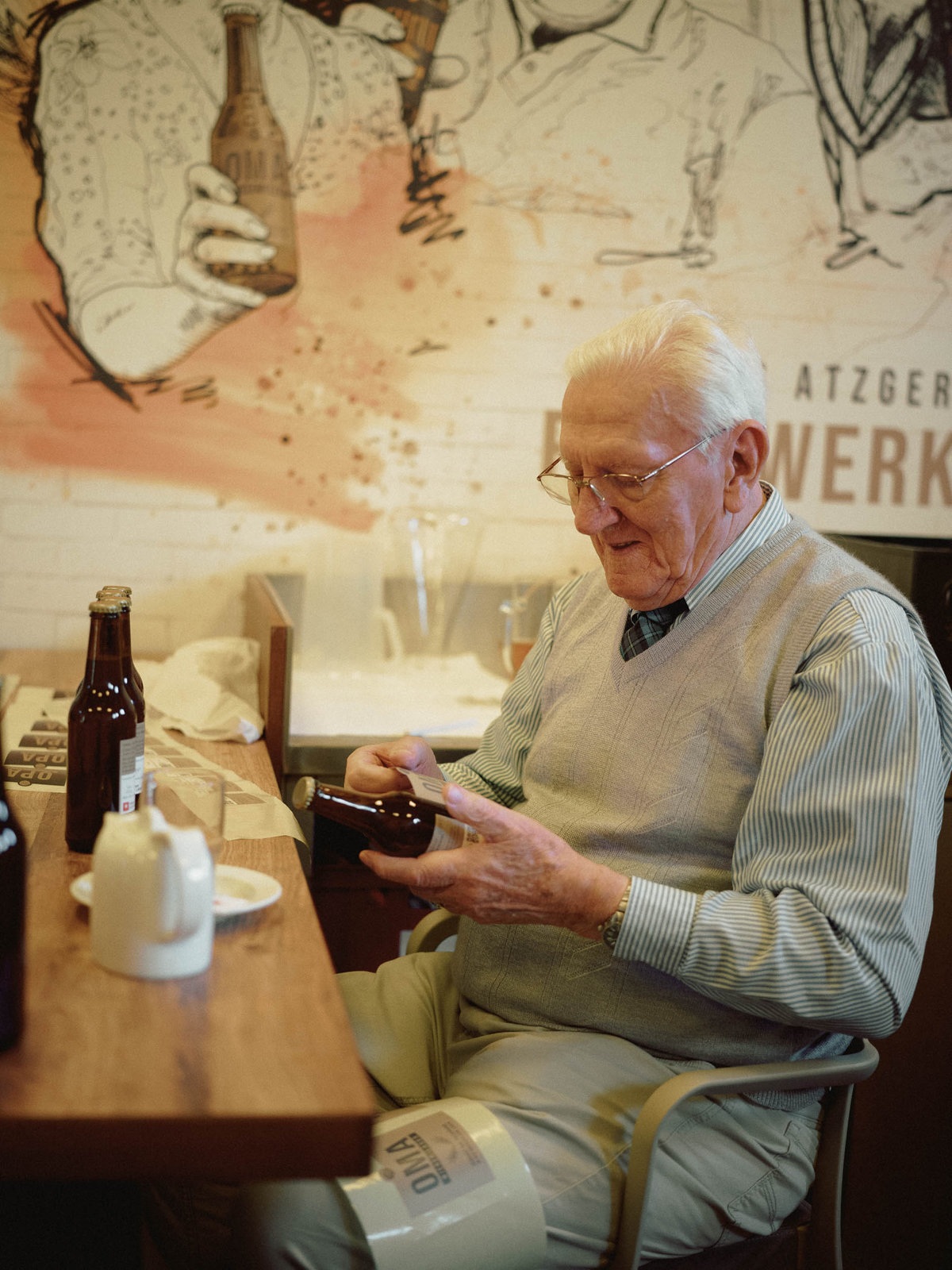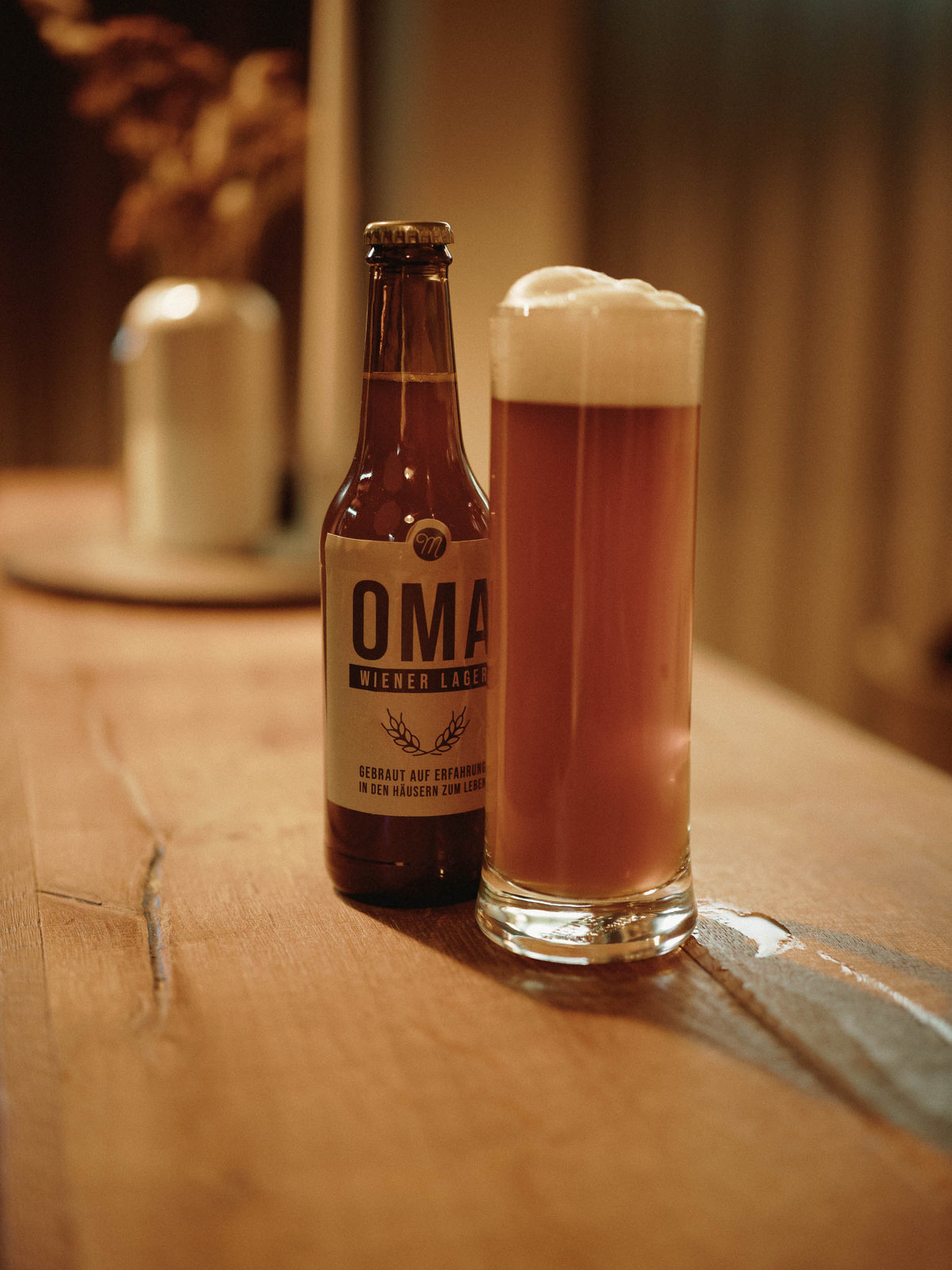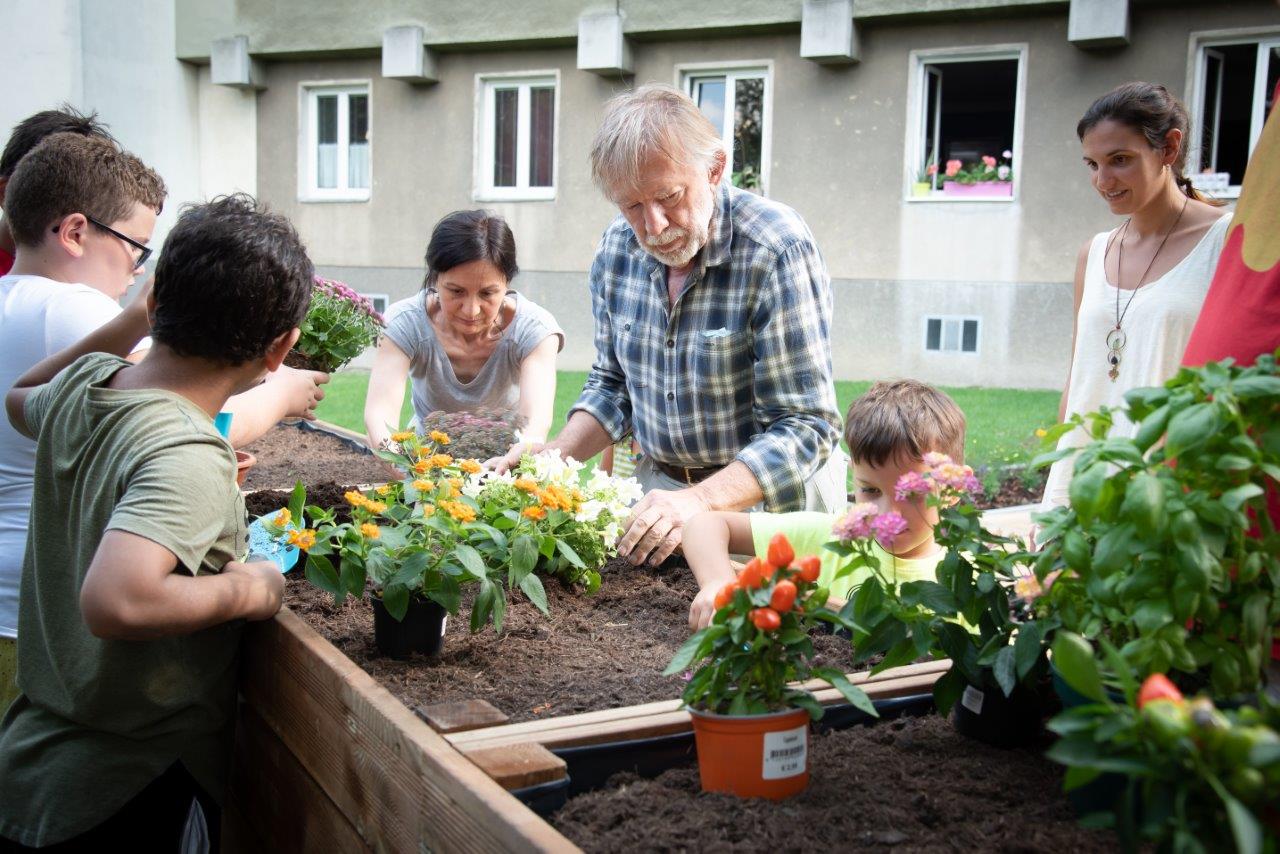The Grandmas and Grandpas Brewing Beer in Vienna
In the maze of neon-lit corridors beneath a senior home on the southwestern outskirts of Vienna, the warm scent of malt leads to a small room that’s become the headquarters of an unlikely microbrewing success story. A colorful mural on the wall depicts five residents of the home enjoying a pint, and beneath, three of them are pitching in on today’s brewing efforts.
 Gustav Paier labeling bottles. Credit: Andreas Jakwerth / Häuser zum Leben
Gustav Paier labeling bottles. Credit: Andreas Jakwerth / Häuser zum Leben
Helmut Riegerbauer always comes in early, and by the time the others have joined he’s already pulled on purple latex gloves and moved to the manual bottle capper. “He’s the only one who gets to wear an official apron,” quips Gustav Paier, himself neatly dressed in a colorful cable-knit sweater. “You have to earn it,” winks Helmut, smoothing the dark green apron emblazoned with the word Brauwerkstatt.
And earn it he does — in the course of the morning he caps around six cases of freshly filled beer bottles, careful to add a tab of priming sugar to each. Occasionally he comes to check on his friends, who are busy with labeling. “I’m the controller,” he explains, swiftly scanning a case and pulling out a bottle missing the back label. Rupert Jaksch, who has taken up his usual position at the end of the table, quickly puts on the missing label for their Viennese lager, called Opa and Oma — Grandpa and Grandma.
The lager was the first beer the Brauwerkstatt in Haus Atzgersdorf started brewing in the summer of 2020, when the Covid lockdowns made life in the senior home especially lonely. The home’s previous director came up with this unusual plan to bring the residents together and give them a meaningful way to spend their time. Helmut, Gustav and Rupert have been part of the project from the start and have become fast friends. They’re all firmly in their 80s, with Rupert the oldest at 88, but the laughter and easy banter make the atmosphere in the room feel unusually festive for a Thursday morning.
 A bottle of Oma (“grandma”) Viennese lager. Credit: Andreas Jakwerth / Häuser zum Leben
A bottle of Oma (“grandma”) Viennese lager. Credit: Andreas Jakwerth / Häuser zum Leben
What started as an off-the-cuff idea has since become a successful microbrewery that can barely keep up with demand. In 2023 the Brauwerkstatt doubled its brewing capacity to 12,000 bottles annually and is planning to double it again this year. The senior home staff takes care of the more physically demanding aspects of the work, but Bernhard Wittholm, a trained beer sommelier who joined the team last year, recognizes that the heart of the project lies elsewhere: “It’s not really about brewing beer but about companionship. The residents have a lot of stories to tell, and it’s good for them to get out of their bubble. You notice that they blossom when they’re here.”
Including the senior residents in the project was crucial from the start, says the home’s director, Christian Ehm: “They’re involved in the whole production process, from brewing to bottling, packaging, a bit of advertising … and drinking.” He laughs. “Doing something you enjoy also keeps you fit and alive.”
Haus Atzgersdorf is one of the 30 Häuser zum Leben (Houses for Living) in Vienna run by KPW, a nonprofit that also includes 150 senior clubs in the city, making it the largest provider of senior care in Austria. While the Brauwerkstatt is one of its most visible projects, a full event calendar ranging from yoga to clown workshops ensures that the seniors in these homes remain active and connected. “We want to change the idea that being old has to be something tragic and passive. We’re convinced that older people have a lot to offer if you give them the right framework,” says KPW spokesperson Hans Grasser.
Credit: Andreas Jakwerth / Häuser zum Leben
The Brauwerkstatt is a place where seniors find companionship and a sense of purpose. It's also a successful brewery.
With the world population aging at an accelerated pace, finding ways to help people thrive in old age is becoming an increasingly pressing concern. In 2020, the World Health Organization launched the Decade of Healthy Aging to spearhead a sustained global effort to improve the lives of seniors. That same year, people over 60 years old outnumbered children under five years old for the first time in history, and by 2050 their number is expected to double to 2.1 billion. Healthy aging is about more than mobility and blood pressure — we are social animals, and social isolation and loneliness have been shown to significantly increase the risk of mental and cognitive decline, physical health conditions such as cardiovascular disease and stroke, and early death.
Crushed by negative news?
Sign up for the Reasons to be Cheerful newsletter.
[contact-form-7]
Increasingly, cities are recognizing the need for a systemic and comprehensive approach to tackling the challenges of an aging population. The German city of Arnsberg launched its Department of Future Aging in 2004, Barcelona announced a plan to become a “senior-friendly city” in 2022 and Vienna, where a quarter of the residents will be over 60 by 2030, has a dedicated “Vienna for seniors” team working on a broad range of topics, from living with dementia to an event-filled Seniors’ Month every October.
Credit: Sarah Bruckner / Häuser zum Leben
Activities at Vienna's Häuser zum Leben (Houses for Living), including yoga, help residents stay active and connected.
While the seniors at Brauwerkstatt found their calling in beer, others have a second career in baking. Vollpension, a popular café and social business in central Vienna, employs “grandmas” (and the occasional “grandpa”) to bake cakes according to their own time-tested recipes. More than half of the 80-strong team is over 60 years old, many of them living alone. Beyond bringing them into regular contact with colleagues and customers of all ages, their work at Vollpension on average increases their monthly income by 40 percent — no small feat in a country where the average woman’s pension is 37 percent lower than a man’s.
Other “grandmas” prefer to devote their time to childcare. For over 50 years the Omadienst (“Grandma service”) has been matching older women in Vienna with families in need of a grandma-like figure to help with childcare. There are some 400 Leihomas (“grandmas-for-hire”) currently active in Vienna, estimates Andrea Beer, who leads the project: “Often they take care of the kids from when they’re babies until they’re in high school, and remain in contact long after they no longer need babysitting.”
 Seniors and children gardening together at the Hofferplatz intergenerational meeting point. Credit: Sarah Bruckner / Häuser zum Leben
Seniors and children gardening together at the Hofferplatz intergenerational meeting point. Credit: Sarah Bruckner / Häuser zum Leben
A number of Viennese senior homes also house kindergartens, a practice that is proving popular worldwide, from Seattle to Singapore. Taking it a step further, some senior homes are also becoming a hub for intergenerational living, solving two problems at once: the struggle of finding affordable housing facing many young people, and the social isolation experienced by seniors. As part of a Young Living program, 50 apartments in the various Häuser zum Leben senior homes are earmarked for students, who contribute 25 hours of volunteer work per month in exchange for affordable rent. At the Humanitas retirement village in the Netherlands six students are living rent-free, offering company and support to their senior neighbors. In the US, a number of colleges partner with senior care facilities to create intergenerational housing solutions, while so-called University-based Retirement Communities (UBRCs) combine senior living with access to university courses and campus facilities for seniors.


Become a sustaining member today!
Join the Reasons to be Cheerful community by supporting our nonprofit publication and giving what you can.
Back in the brewery, the seniors are joined by Lukas and Andy, high school students who are doing a two-week internship at the senior home as part of Compassion Project, a social learning initiative. Rupert is showing them how to label the beer bottles. Keeping the labels straight and smooth is not as easy as it seems, but after almost four years of weekly practice, he’s a pro. From the handle of his wheelchair hangs a black felt bag emblazoned with the motto “the Beauty and the Beer,” a present from his daughter. “This here is our second life chapter,” he says. “And we’re happy to still be needed.”
The post The Grandmas and Grandpas Brewing Beer in Vienna appeared first on Reasons to be Cheerful.